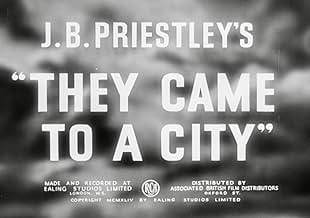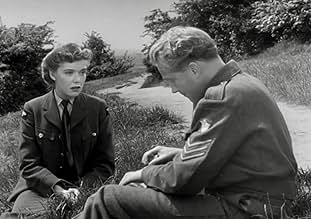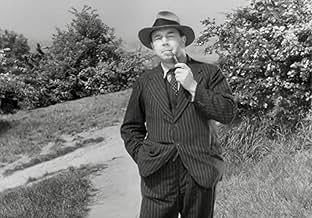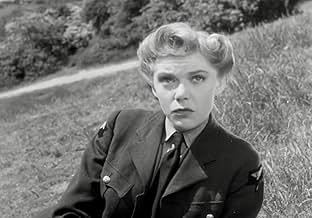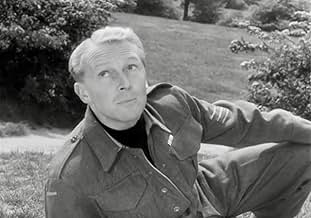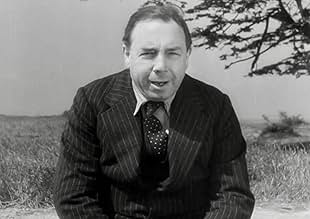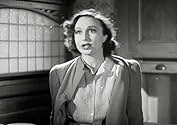Füge eine Handlung in deiner Sprache hinzuAdapted from a J.B. Priestley play with many of the original actors. The tale of various people who have come to live in an "ideal" city and their hopes and reasons for doing so.Adapted from a J.B. Priestley play with many of the original actors. The tale of various people who have come to live in an "ideal" city and their hopes and reasons for doing so.Adapted from a J.B. Priestley play with many of the original actors. The tale of various people who have come to live in an "ideal" city and their hopes and reasons for doing so.
Mabel Terry-Lewis
- Lady Loxfield
- (as Mabel Terry Lewis)
Fanny Rowe
- Philippa Loxfield
- (as Frances Rowe)
Brenda Bruce
- WAAF
- (Nicht genannt)
Ralph Michael
- Sergeant Jimmy
- (Nicht genannt)
J.B. Priestley
- J.B. Priestley
- (Nicht genannt)
Johnnie Schofield
- Bert the Barman
- (Nicht genannt)
Empfohlene Bewertungen
A very pleasant surprise. This is an allegory about an imagined socialist paradise, and the judgements that various archetypical citizens would have of it. I Loved it.
It happens that I watched this - on FUBI - on the same night that I watched a documentary about Jane Jacobs, the sociologist of cities and advocate of bottom-up community building. This was a perfect follow up.
It's presented as a series of exchanges between the disparate characters, contrasting their values, experience and social orientation. While it could be criticized as didactic and predictable, I found it well executed and fun. I especially loved Googie Withers as the working class gal whose been around the block a few times but isn't ready to go cynical.
In tone and flavor it's like a blend of Capra with Powell & Pressburger.
It happens that I watched this - on FUBI - on the same night that I watched a documentary about Jane Jacobs, the sociologist of cities and advocate of bottom-up community building. This was a perfect follow up.
It's presented as a series of exchanges between the disparate characters, contrasting their values, experience and social orientation. While it could be criticized as didactic and predictable, I found it well executed and fun. I especially loved Googie Withers as the working class gal whose been around the block a few times but isn't ready to go cynical.
In tone and flavor it's like a blend of Capra with Powell & Pressburger.
Based on J. B. Priestley's play, 9 characters from wildly different social backgrounds disappear into the dark one night and arrive at a vast structure which has an entrance to a new, never seen, city. Each of the 9 enter and then decide whether this apparent Utopia is for them or not.
Strange, wordy piece making little attempt to hide its stage origins. This was intended to look at Britain towards the end of the war and how as a society it was to land in its feet. Regrettably, Priestly, who appears briefly, clearly has decided which characters and classes are the good guys and which are the bad. So whilst there are certainly some interesting characters and ideas here, this rather didactic lecture makes it clear that the hard working, poorer and the left wing seeking the searches for Utopia are all right and the right wing are all upper class idiots frightened of change and only interested in money. It's all far too black and white with too many cliched characters and political speeches, particularly by free thinking revolutionary Dinmore played by John Clements who cries for change eloquently whilst the upper classes mumble and moan. It's a pity, because it's a fun idea and with a gentler touch and perhaps more ambiguity it could have been more interesting than it is. An intriguing but not wholly successful cinema oddity.
Strange, wordy piece making little attempt to hide its stage origins. This was intended to look at Britain towards the end of the war and how as a society it was to land in its feet. Regrettably, Priestly, who appears briefly, clearly has decided which characters and classes are the good guys and which are the bad. So whilst there are certainly some interesting characters and ideas here, this rather didactic lecture makes it clear that the hard working, poorer and the left wing seeking the searches for Utopia are all right and the right wing are all upper class idiots frightened of change and only interested in money. It's all far too black and white with too many cliched characters and political speeches, particularly by free thinking revolutionary Dinmore played by John Clements who cries for change eloquently whilst the upper classes mumble and moan. It's a pity, because it's a fun idea and with a gentler touch and perhaps more ambiguity it could have been more interesting than it is. An intriguing but not wholly successful cinema oddity.
This is a very unusual film as its a 1940s surrealist one made by Ealing Studios and is simply unknown by the majority of the public. Trust Talking Pictures TV to bring it back to the public consciousness in 2024.
I was attracted to this film as I have a soft spot for old movies which have an air of the surreal, as its always interesting to see how fantasy elements are executed without the crux of CGI and computing power. A great example of a film that does this well is A Matter Of Life And Death.
The current film however is not on the same level, as it has less of the fantasy elements of Life And Death. It is basically a film about nine individuals from the social ranks of British society who are granted the opportunity to enter into a Utopian ideal city. The majority of the film is each character voicing their reasons of whether they have decided to stay in this city or return back to the previous lives. Where the movie falls flat is that its basically a communist propaganda reel in which the haves are evil and the have nots are virtuous. The problem with the author of this story is nobody seems to have told him that Utopia's simply don't work. People being as they are, so the entire notion of people deciding on whether to stay is irrelevant. To argue that point doesn't matter because its a movie makes no sense, because the film is an obvious social commentary. Of course its the bad people who don't want anything to do with the Utopia and the good people who do. More propaganda. But unless the author can come up with the magical way that an entire city can run where everybody is happy all the time and there are no problems because everyone works together, its a moot point to pour disdain on people who would refuse to live there. Maybe its because they know its all an unobtainable fantasy. The far left have always had this fantasy of a Utopia which they think would happen if everybody did what they said, and this movie is a great example of such flawed and simplistic reasoning. Its obvious from the ratings that many people either found this boring or recoiled at the communist slant of the narrative. Its an interesting watch for how strange it is, its simply not a great movie and its political angle comes across as extremely naive, maybe the collapse of communist societies hadn't happened yet.
I was attracted to this film as I have a soft spot for old movies which have an air of the surreal, as its always interesting to see how fantasy elements are executed without the crux of CGI and computing power. A great example of a film that does this well is A Matter Of Life And Death.
The current film however is not on the same level, as it has less of the fantasy elements of Life And Death. It is basically a film about nine individuals from the social ranks of British society who are granted the opportunity to enter into a Utopian ideal city. The majority of the film is each character voicing their reasons of whether they have decided to stay in this city or return back to the previous lives. Where the movie falls flat is that its basically a communist propaganda reel in which the haves are evil and the have nots are virtuous. The problem with the author of this story is nobody seems to have told him that Utopia's simply don't work. People being as they are, so the entire notion of people deciding on whether to stay is irrelevant. To argue that point doesn't matter because its a movie makes no sense, because the film is an obvious social commentary. Of course its the bad people who don't want anything to do with the Utopia and the good people who do. More propaganda. But unless the author can come up with the magical way that an entire city can run where everybody is happy all the time and there are no problems because everyone works together, its a moot point to pour disdain on people who would refuse to live there. Maybe its because they know its all an unobtainable fantasy. The far left have always had this fantasy of a Utopia which they think would happen if everybody did what they said, and this movie is a great example of such flawed and simplistic reasoning. Its obvious from the ratings that many people either found this boring or recoiled at the communist slant of the narrative. Its an interesting watch for how strange it is, its simply not a great movie and its political angle comes across as extremely naive, maybe the collapse of communist societies hadn't happened yet.
The main title actually says 'J. B. Priestley's They Came to a City', and the film constitutes the second of three brief wartime flirtations with fantasy by Ealing Studios.
Coming late in the war when enlightened opinion was already contemplating what was to come next, the ideals it expressed had already found voice in the Boulting Brothers short 'Dawn Guard' and thematically owed a lot to Sutton Vane's 'Outward Bound', James Hilton's 'Lost Horizon' and Priestley's own 1937 fantasy 'I Have Been Here Before'; while the striking production design seems to show the influence of German silent cinema.
Beginning and ending with the genial figure of Mr Priestley ambling on and off, it's not for all tastes, but is certainly quite unlike any other British film before or after.
Coming late in the war when enlightened opinion was already contemplating what was to come next, the ideals it expressed had already found voice in the Boulting Brothers short 'Dawn Guard' and thematically owed a lot to Sutton Vane's 'Outward Bound', James Hilton's 'Lost Horizon' and Priestley's own 1937 fantasy 'I Have Been Here Before'; while the striking production design seems to show the influence of German silent cinema.
Beginning and ending with the genial figure of Mr Priestley ambling on and off, it's not for all tastes, but is certainly quite unlike any other British film before or after.
I usually enjoy malcolmgsw's reviews but this time we have to agree to differ: I consider this, far from being the worst British film, rather amongst the best. Of course, it depends upon what one considers important, how one views our history and the changes in politics. Not long ago, millions of Brits had a vision of a better and more just way of managing things and hopes for a better life for all. This film may have helped the Attlee government gain power the next year, but now all is lost and gone since Clause 4 was thrown out in 1995. The present generation is unhappy but doesn't seem interested in the hopes which this film is concerned with. The acting and the lighting effects are powerful, so it really wouldn't do to sit with one's eyes shut. Of course, if you're hoping for light entertainment and giggles, this film is not for you. It ought to be mentioned that the verse of poetry is taken slightly out of context: 'I dreamed that was the new city of Friends' with a capital 'F', meaning Quakers. It was about the hopes for the founding of Philadelphia in 1681. When a child, Walt Whitman was deeply influenced by a powerful Quaker preacher, and it shows in verses such as this. I can't imagine Whitman would mind his words being applied to this story.
Wusstest du schon
- WissenswertesFinal film of Mabel Terry-Lewis.
- Zitate
Alice Foster: I never thought there *could* be a place as good as this.
- VerbindungenFeatured in Sosialismi (2014)
- SoundtracksMusic selected from The Divine Poem
Music by Aleksandr Skryabin (as Scriabin)
Played by The London Philharmonic Orchestra
Conducted by Ernest Irving
Top-Auswahl
Melde dich zum Bewerten an und greife auf die Watchlist für personalisierte Empfehlungen zu.
Details
- Laufzeit1 Stunde 18 Minuten
- Farbe
- Seitenverhältnis
- 1.37 : 1
Zu dieser Seite beitragen
Bearbeitung vorschlagen oder fehlenden Inhalt hinzufügen

Oberste Lücke
By what name was They Came to a City (1944) officially released in India in English?
Antwort
